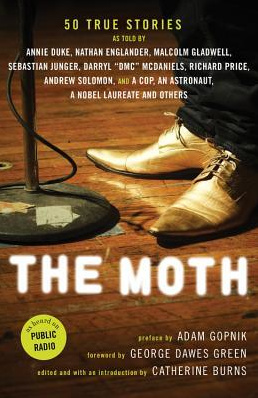

“I was perhaps as intensely naïve to think I could get a job working with the Yankees. But the lesson to me is that with a great deal of persistence and a little bit of common sense, even if the thing you’re chasing may not exist, you can sometimes will it into being.”
― quote from The Moth
“that when we can celebrate and truly own what it is that makes us different, we’re able to find the source of our greatest creative power.”
― quote from The Moth
“There was a nook in the house that contained what they called the Turkish Room, which was for intimate conversation. And when my mother had her sixth birthday, her grandmother led her into the Turkish Room. They were both named Inez. And on that day Big Inez gave Little Inez a plantation all her own. Two thousand acres. Then her little sister came running in and said, “Grandmother, can I have a plantation too?” And Big Inez looked down and said, “Child, your name is Alice. You were named for your Yankee grandmother. Go ask your Yankee grandmother for a plantation.”
― quote from The Moth
“The great storyteller Frank O’Connor defined it best, saying once that every good story should end, in spirit, with the exact same words: “And everything that ever happened to me afterwards, I never felt the same about again.”
― quote from The Moth
“Orwell’s famous lesson, “Autobiography is only to be trusted when it reveals something disgraceful. A man who gives a good account of himself is probably lying, since any life when viewed from the inside is simply a series of defeats.”
― quote from The Moth

“How could I forget you, Darryl? You called me God.”
― quote from The Moth
“I swear his pheromones have my freaking name written on them. They hone in and attack.”
― Carrie Jones, quote from Captivate
“Just say it,” I beg. I need her to say it out loud. All I need is for her to admit she brought him here because she was hurt and scared. I need her to admit that there’s an actual heart inside her chest. And that sometimes it beats for me”
― Colleen Hoover, quote from Maybe Not
“She seemed so happy, so at peace, and I wondered how anybody around me could feel that way when liquid fire was raging inside me, when fear was mingling with hope and clutching itself around my ankles.”
― Chimamanda Ngozi Adichie, quote from Purple Hibiscus
“You can't kill a minuet de la coeur. You may shut up the music book... but surely the minuet-- the minuet itself is dancing itself away into the furthest stars, even as our minuet of the Hessian bathing places must be stepping itself still. Isn't there any heaven where old beautiful dances, old beautiful intimacies prolong themselves? Isn't there any Nirvana pervaded by the vain thrilling of instruments that have fallen into the dust of wormwood but that yet had frail, tremulous, and everlasting souls?”
― Ford Madox Ford, quote from The Good Soldier
“Danger lies in the extreme. A man who is always cruel is evil, a man who is always compassionate will be taken advantage of. It is more a question of balance, or harmony, if you will.”
― David Gemmell, quote from Lord of the Silver Bow
BookQuoters is a community of passionate readers who enjoy sharing the most meaningful, memorable and interesting quotes from great books. As the world communicates more and more via texts, memes and sound bytes, short but profound quotes from books have become more relevant and important. For some of us a quote becomes a mantra, a goal or a philosophy by which we live. For all of us, quotes are a great way to remember a book and to carry with us the author’s best ideas.
We thoughtfully gather quotes from our favorite books, both classic and current, and choose the ones that are most thought-provoking. Each quote represents a book that is interesting, well written and has potential to enhance the reader’s life. We also accept submissions from our visitors and will select the quotes we feel are most appealing to the BookQuoters community.
Founded in 2023, BookQuoters has quickly become a large and vibrant community of people who share an affinity for books. Books are seen by some as a throwback to a previous world; conversely, gleaning the main ideas of a book via a quote or a quick summary is typical of the Information Age but is a habit disdained by some diehard readers. We feel that we have the best of both worlds at BookQuoters; we read books cover-to-cover but offer you some of the highlights. We hope you’ll join us.